BSc Business Management with Foundation: Functional Areas Report
VerifiedAdded on 2022/11/24
|7
|1858
|328
Report
AI Summary
This report examines the core functional areas of a business, including marketing, human resource management, customer service, finance, research and development, and sales. It defines what constitutes a business and its functional areas, offering detailed descriptions of each department's responsibilities. The report also outlines the essential skills needed for employees to effectively perform their roles within each function, such as communication, analytical thinking, and problem-solving. The report uses a case study of a lottery winner to illustrate the practical application of business functions and the skills required for effective management, providing a comprehensive overview of how different departments contribute to the overall success of a business.
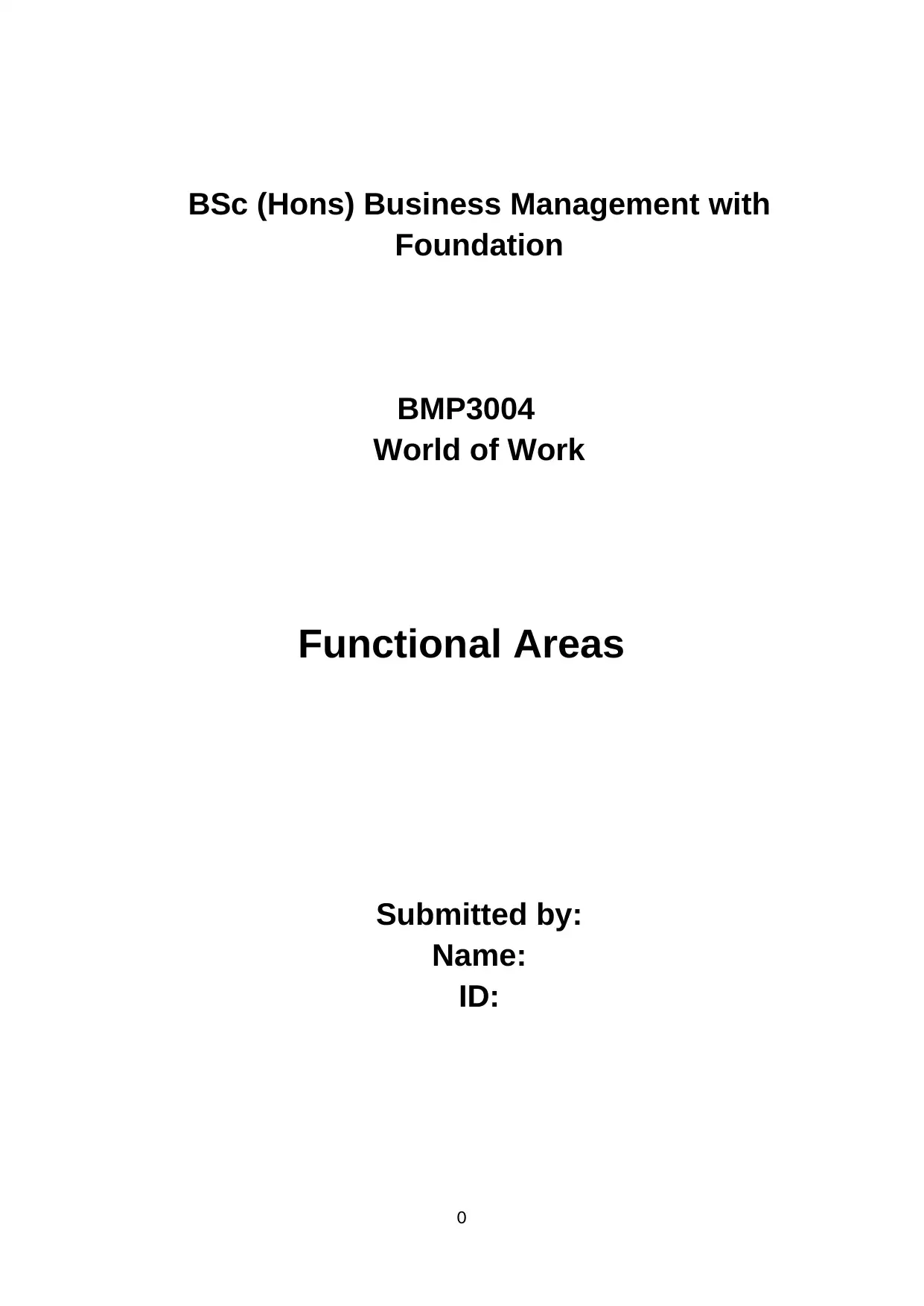
BSc (Hons) Business Management with
Foundation
BMP3004
World of Work
Functional Areas
Submitted by:
Name:
ID:
0
Foundation
BMP3004
World of Work
Functional Areas
Submitted by:
Name:
ID:
0
Paraphrase This Document
Need a fresh take? Get an instant paraphrase of this document with our AI Paraphraser
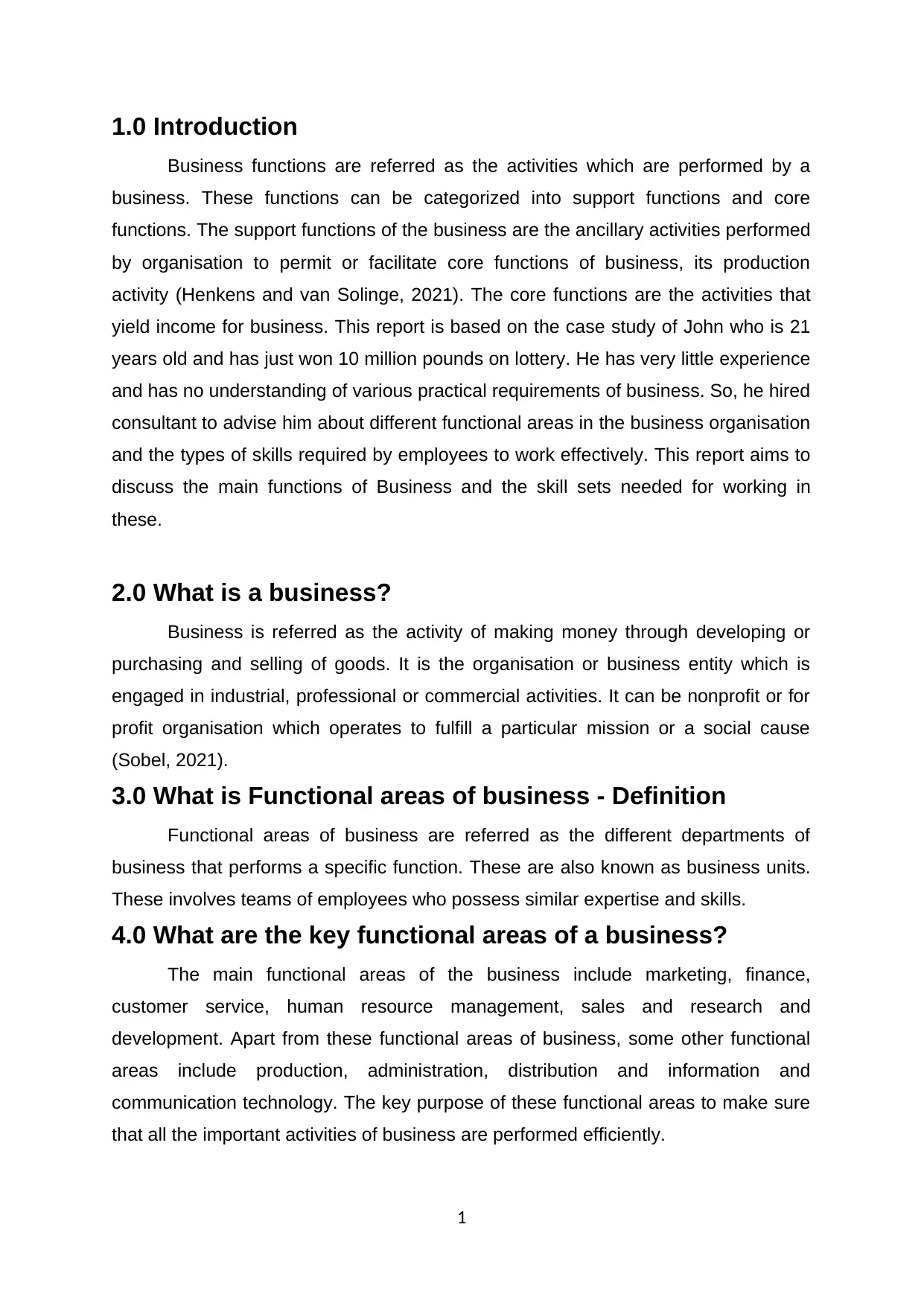
1.0 Introduction
Business functions are referred as the activities which are performed by a
business. These functions can be categorized into support functions and core
functions. The support functions of the business are the ancillary activities performed
by organisation to permit or facilitate core functions of business, its production
activity (Henkens and van Solinge, 2021). The core functions are the activities that
yield income for business. This report is based on the case study of John who is 21
years old and has just won 10 million pounds on lottery. He has very little experience
and has no understanding of various practical requirements of business. So, he hired
consultant to advise him about different functional areas in the business organisation
and the types of skills required by employees to work effectively. This report aims to
discuss the main functions of Business and the skill sets needed for working in
these.
2.0 What is a business?
Business is referred as the activity of making money through developing or
purchasing and selling of goods. It is the organisation or business entity which is
engaged in industrial, professional or commercial activities. It can be nonprofit or for
profit organisation which operates to fulfill a particular mission or a social cause
(Sobel, 2021).
3.0 What is Functional areas of business - Definition
Functional areas of business are referred as the different departments of
business that performs a specific function. These are also known as business units.
These involves teams of employees who possess similar expertise and skills.
4.0 What are the key functional areas of a business?
The main functional areas of the business include marketing, finance,
customer service, human resource management, sales and research and
development. Apart from these functional areas of business, some other functional
areas include production, administration, distribution and information and
communication technology. The key purpose of these functional areas to make sure
that all the important activities of business are performed efficiently.
1
Business functions are referred as the activities which are performed by a
business. These functions can be categorized into support functions and core
functions. The support functions of the business are the ancillary activities performed
by organisation to permit or facilitate core functions of business, its production
activity (Henkens and van Solinge, 2021). The core functions are the activities that
yield income for business. This report is based on the case study of John who is 21
years old and has just won 10 million pounds on lottery. He has very little experience
and has no understanding of various practical requirements of business. So, he hired
consultant to advise him about different functional areas in the business organisation
and the types of skills required by employees to work effectively. This report aims to
discuss the main functions of Business and the skill sets needed for working in
these.
2.0 What is a business?
Business is referred as the activity of making money through developing or
purchasing and selling of goods. It is the organisation or business entity which is
engaged in industrial, professional or commercial activities. It can be nonprofit or for
profit organisation which operates to fulfill a particular mission or a social cause
(Sobel, 2021).
3.0 What is Functional areas of business - Definition
Functional areas of business are referred as the different departments of
business that performs a specific function. These are also known as business units.
These involves teams of employees who possess similar expertise and skills.
4.0 What are the key functional areas of a business?
The main functional areas of the business include marketing, finance,
customer service, human resource management, sales and research and
development. Apart from these functional areas of business, some other functional
areas include production, administration, distribution and information and
communication technology. The key purpose of these functional areas to make sure
that all the important activities of business are performed efficiently.
1
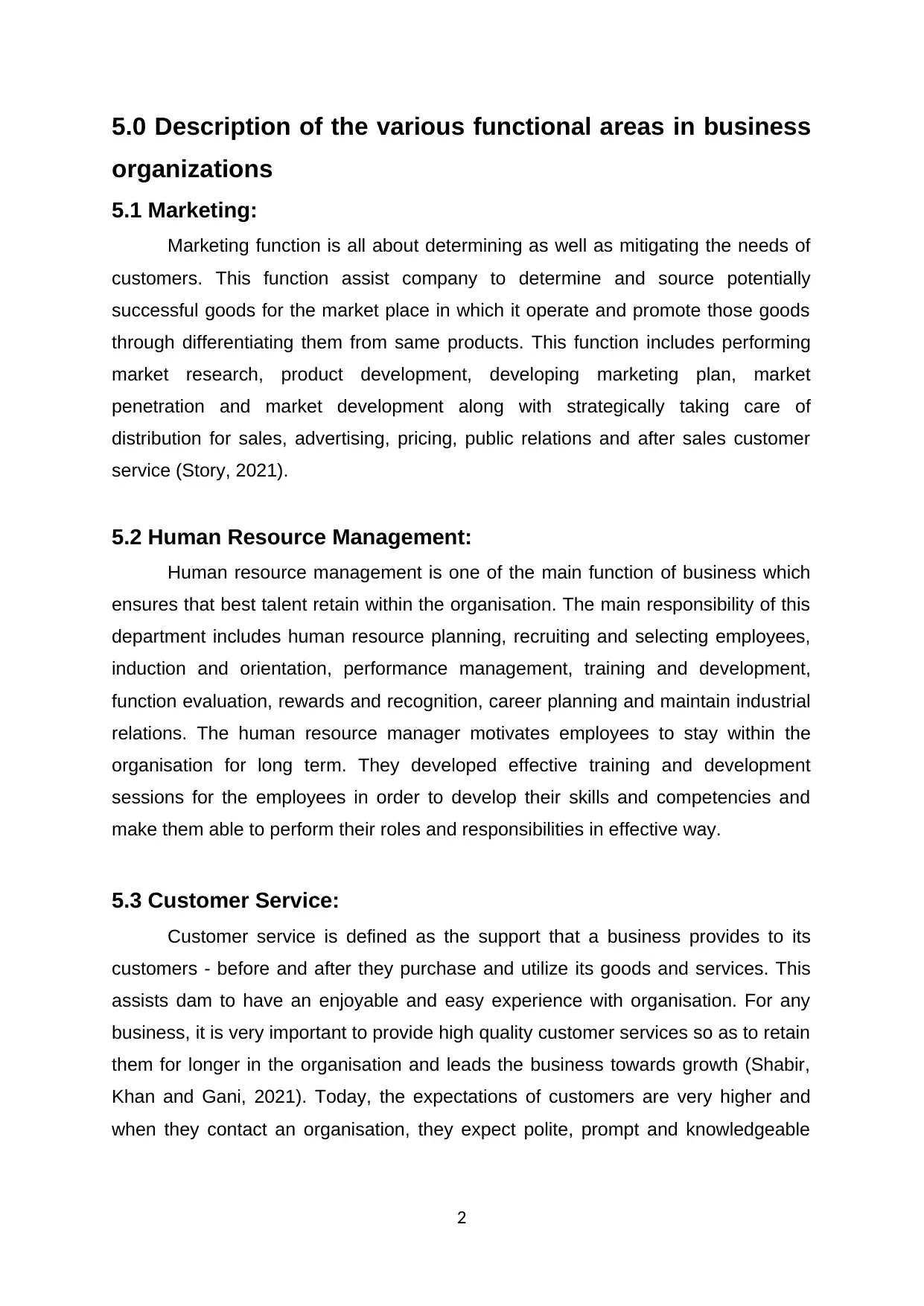
5.0 Description of the various functional areas in business
organizations
5.1 Marketing:
Marketing function is all about determining as well as mitigating the needs of
customers. This function assist company to determine and source potentially
successful goods for the market place in which it operate and promote those goods
through differentiating them from same products. This function includes performing
market research, product development, developing marketing plan, market
penetration and market development along with strategically taking care of
distribution for sales, advertising, pricing, public relations and after sales customer
service (Story, 2021).
5.2 Human Resource Management:
Human resource management is one of the main function of business which
ensures that best talent retain within the organisation. The main responsibility of this
department includes human resource planning, recruiting and selecting employees,
induction and orientation, performance management, training and development,
function evaluation, rewards and recognition, career planning and maintain industrial
relations. The human resource manager motivates employees to stay within the
organisation for long term. They developed effective training and development
sessions for the employees in order to develop their skills and competencies and
make them able to perform their roles and responsibilities in effective way.
5.3 Customer Service:
Customer service is defined as the support that a business provides to its
customers - before and after they purchase and utilize its goods and services. This
assists dam to have an enjoyable and easy experience with organisation. For any
business, it is very important to provide high quality customer services so as to retain
them for longer in the organisation and leads the business towards growth (Shabir,
Khan and Gani, 2021). Today, the expectations of customers are very higher and
when they contact an organisation, they expect polite, prompt and knowledgeable
2
organizations
5.1 Marketing:
Marketing function is all about determining as well as mitigating the needs of
customers. This function assist company to determine and source potentially
successful goods for the market place in which it operate and promote those goods
through differentiating them from same products. This function includes performing
market research, product development, developing marketing plan, market
penetration and market development along with strategically taking care of
distribution for sales, advertising, pricing, public relations and after sales customer
service (Story, 2021).
5.2 Human Resource Management:
Human resource management is one of the main function of business which
ensures that best talent retain within the organisation. The main responsibility of this
department includes human resource planning, recruiting and selecting employees,
induction and orientation, performance management, training and development,
function evaluation, rewards and recognition, career planning and maintain industrial
relations. The human resource manager motivates employees to stay within the
organisation for long term. They developed effective training and development
sessions for the employees in order to develop their skills and competencies and
make them able to perform their roles and responsibilities in effective way.
5.3 Customer Service:
Customer service is defined as the support that a business provides to its
customers - before and after they purchase and utilize its goods and services. This
assists dam to have an enjoyable and easy experience with organisation. For any
business, it is very important to provide high quality customer services so as to retain
them for longer in the organisation and leads the business towards growth (Shabir,
Khan and Gani, 2021). Today, the expectations of customers are very higher and
when they contact an organisation, they expect polite, prompt and knowledgeable
2
⊘ This is a preview!⊘
Do you want full access?
Subscribe today to unlock all pages.

Trusted by 1+ million students worldwide
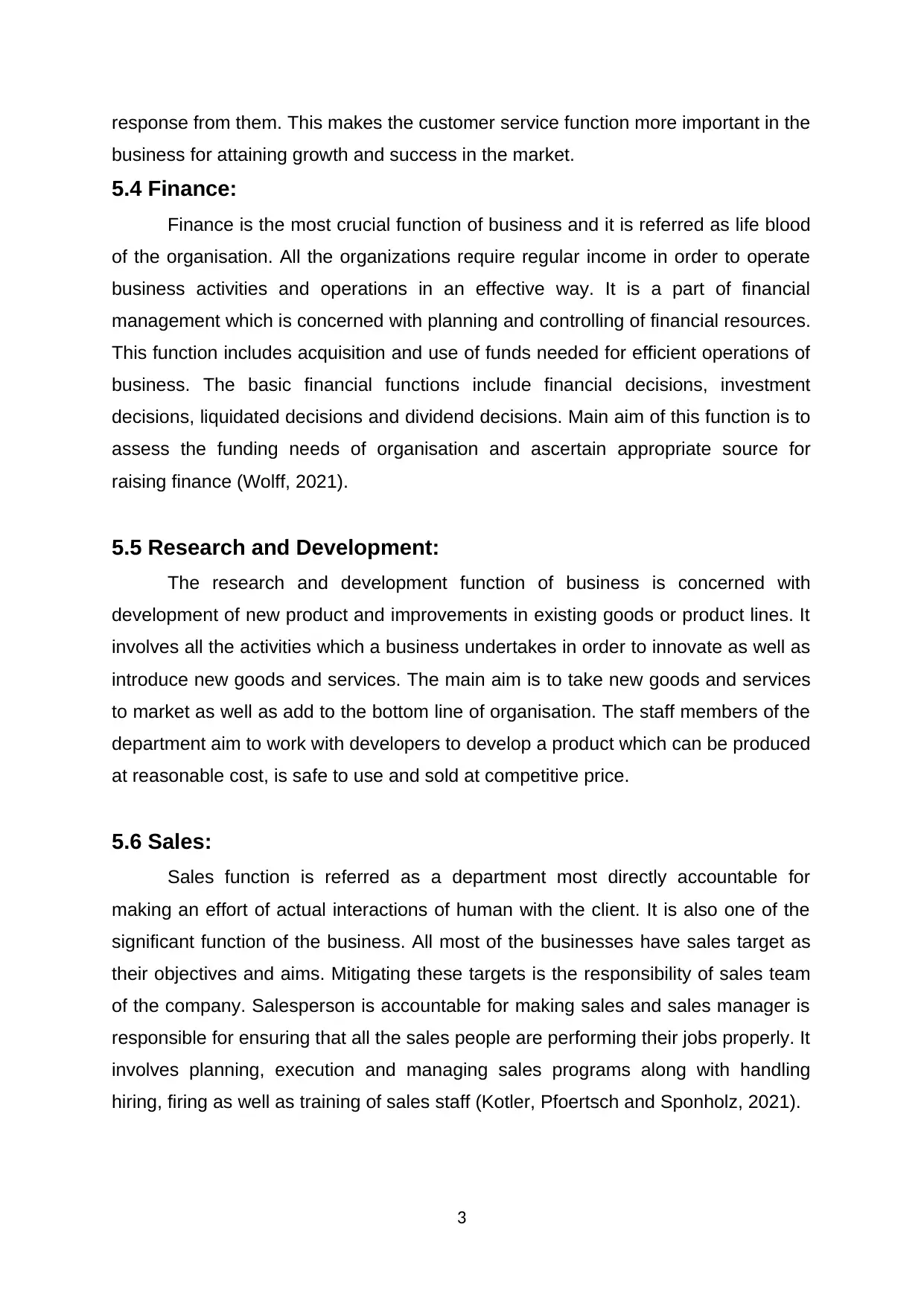
response from them. This makes the customer service function more important in the
business for attaining growth and success in the market.
5.4 Finance:
Finance is the most crucial function of business and it is referred as life blood
of the organisation. All the organizations require regular income in order to operate
business activities and operations in an effective way. It is a part of financial
management which is concerned with planning and controlling of financial resources.
This function includes acquisition and use of funds needed for efficient operations of
business. The basic financial functions include financial decisions, investment
decisions, liquidated decisions and dividend decisions. Main aim of this function is to
assess the funding needs of organisation and ascertain appropriate source for
raising finance (Wolff, 2021).
5.5 Research and Development:
The research and development function of business is concerned with
development of new product and improvements in existing goods or product lines. It
involves all the activities which a business undertakes in order to innovate as well as
introduce new goods and services. The main aim is to take new goods and services
to market as well as add to the bottom line of organisation. The staff members of the
department aim to work with developers to develop a product which can be produced
at reasonable cost, is safe to use and sold at competitive price.
5.6 Sales:
Sales function is referred as a department most directly accountable for
making an effort of actual interactions of human with the client. It is also one of the
significant function of the business. All most of the businesses have sales target as
their objectives and aims. Mitigating these targets is the responsibility of sales team
of the company. Salesperson is accountable for making sales and sales manager is
responsible for ensuring that all the sales people are performing their jobs properly. It
involves planning, execution and managing sales programs along with handling
hiring, firing as well as training of sales staff (Kotler, Pfoertsch and Sponholz, 2021).
3
business for attaining growth and success in the market.
5.4 Finance:
Finance is the most crucial function of business and it is referred as life blood
of the organisation. All the organizations require regular income in order to operate
business activities and operations in an effective way. It is a part of financial
management which is concerned with planning and controlling of financial resources.
This function includes acquisition and use of funds needed for efficient operations of
business. The basic financial functions include financial decisions, investment
decisions, liquidated decisions and dividend decisions. Main aim of this function is to
assess the funding needs of organisation and ascertain appropriate source for
raising finance (Wolff, 2021).
5.5 Research and Development:
The research and development function of business is concerned with
development of new product and improvements in existing goods or product lines. It
involves all the activities which a business undertakes in order to innovate as well as
introduce new goods and services. The main aim is to take new goods and services
to market as well as add to the bottom line of organisation. The staff members of the
department aim to work with developers to develop a product which can be produced
at reasonable cost, is safe to use and sold at competitive price.
5.6 Sales:
Sales function is referred as a department most directly accountable for
making an effort of actual interactions of human with the client. It is also one of the
significant function of the business. All most of the businesses have sales target as
their objectives and aims. Mitigating these targets is the responsibility of sales team
of the company. Salesperson is accountable for making sales and sales manager is
responsible for ensuring that all the sales people are performing their jobs properly. It
involves planning, execution and managing sales programs along with handling
hiring, firing as well as training of sales staff (Kotler, Pfoertsch and Sponholz, 2021).
3
Paraphrase This Document
Need a fresh take? Get an instant paraphrase of this document with our AI Paraphraser
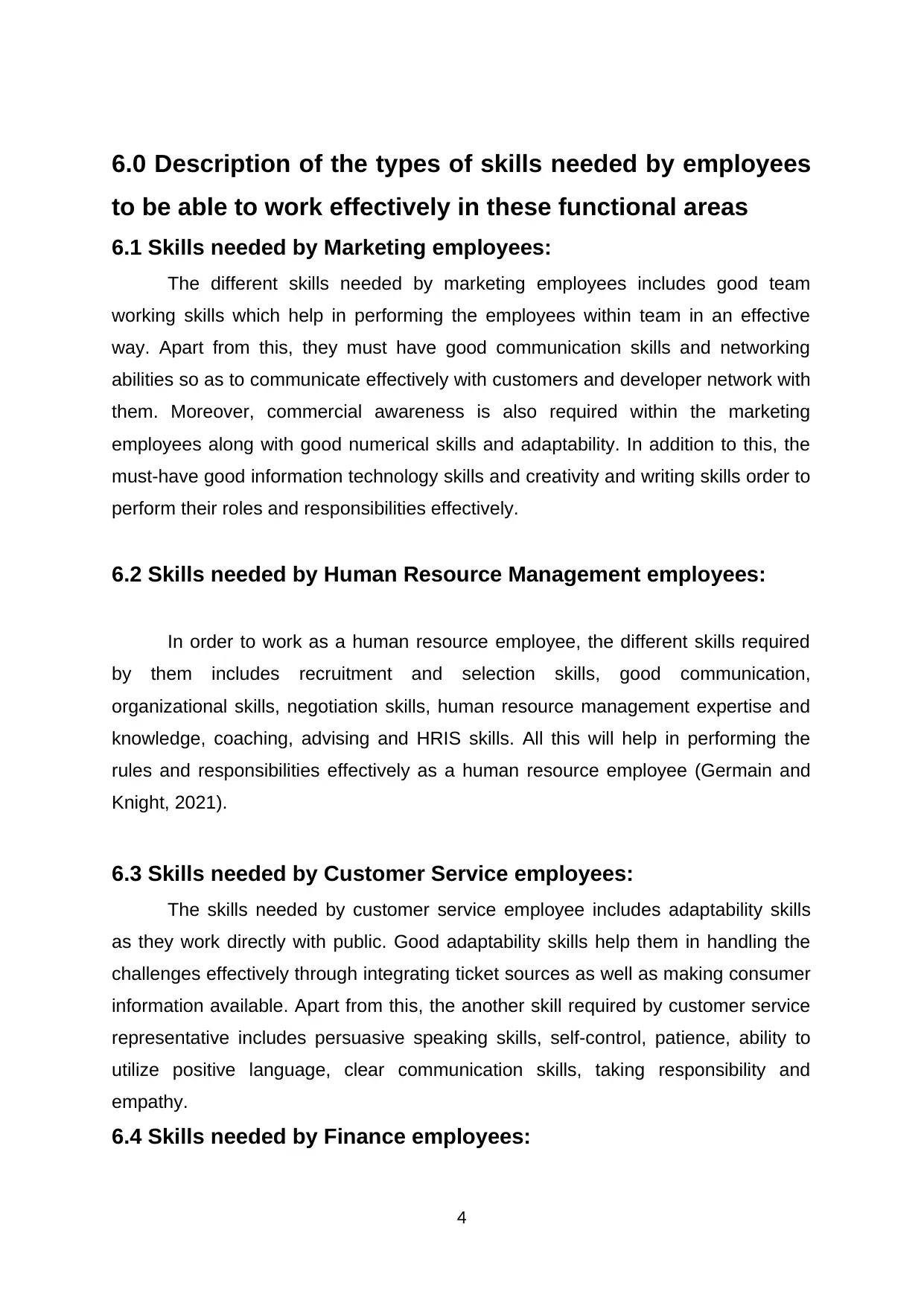
6.0 Description of the types of skills needed by employees
to be able to work effectively in these functional areas
6.1 Skills needed by Marketing employees:
The different skills needed by marketing employees includes good team
working skills which help in performing the employees within team in an effective
way. Apart from this, they must have good communication skills and networking
abilities so as to communicate effectively with customers and developer network with
them. Moreover, commercial awareness is also required within the marketing
employees along with good numerical skills and adaptability. In addition to this, the
must-have good information technology skills and creativity and writing skills order to
perform their roles and responsibilities effectively.
6.2 Skills needed by Human Resource Management employees:
In order to work as a human resource employee, the different skills required
by them includes recruitment and selection skills, good communication,
organizational skills, negotiation skills, human resource management expertise and
knowledge, coaching, advising and HRIS skills. All this will help in performing the
rules and responsibilities effectively as a human resource employee (Germain and
Knight, 2021).
6.3 Skills needed by Customer Service employees:
The skills needed by customer service employee includes adaptability skills
as they work directly with public. Good adaptability skills help them in handling the
challenges effectively through integrating ticket sources as well as making consumer
information available. Apart from this, the another skill required by customer service
representative includes persuasive speaking skills, self-control, patience, ability to
utilize positive language, clear communication skills, taking responsibility and
empathy.
6.4 Skills needed by Finance employees:
4
to be able to work effectively in these functional areas
6.1 Skills needed by Marketing employees:
The different skills needed by marketing employees includes good team
working skills which help in performing the employees within team in an effective
way. Apart from this, they must have good communication skills and networking
abilities so as to communicate effectively with customers and developer network with
them. Moreover, commercial awareness is also required within the marketing
employees along with good numerical skills and adaptability. In addition to this, the
must-have good information technology skills and creativity and writing skills order to
perform their roles and responsibilities effectively.
6.2 Skills needed by Human Resource Management employees:
In order to work as a human resource employee, the different skills required
by them includes recruitment and selection skills, good communication,
organizational skills, negotiation skills, human resource management expertise and
knowledge, coaching, advising and HRIS skills. All this will help in performing the
rules and responsibilities effectively as a human resource employee (Germain and
Knight, 2021).
6.3 Skills needed by Customer Service employees:
The skills needed by customer service employee includes adaptability skills
as they work directly with public. Good adaptability skills help them in handling the
challenges effectively through integrating ticket sources as well as making consumer
information available. Apart from this, the another skill required by customer service
representative includes persuasive speaking skills, self-control, patience, ability to
utilize positive language, clear communication skills, taking responsibility and
empathy.
6.4 Skills needed by Finance employees:
4
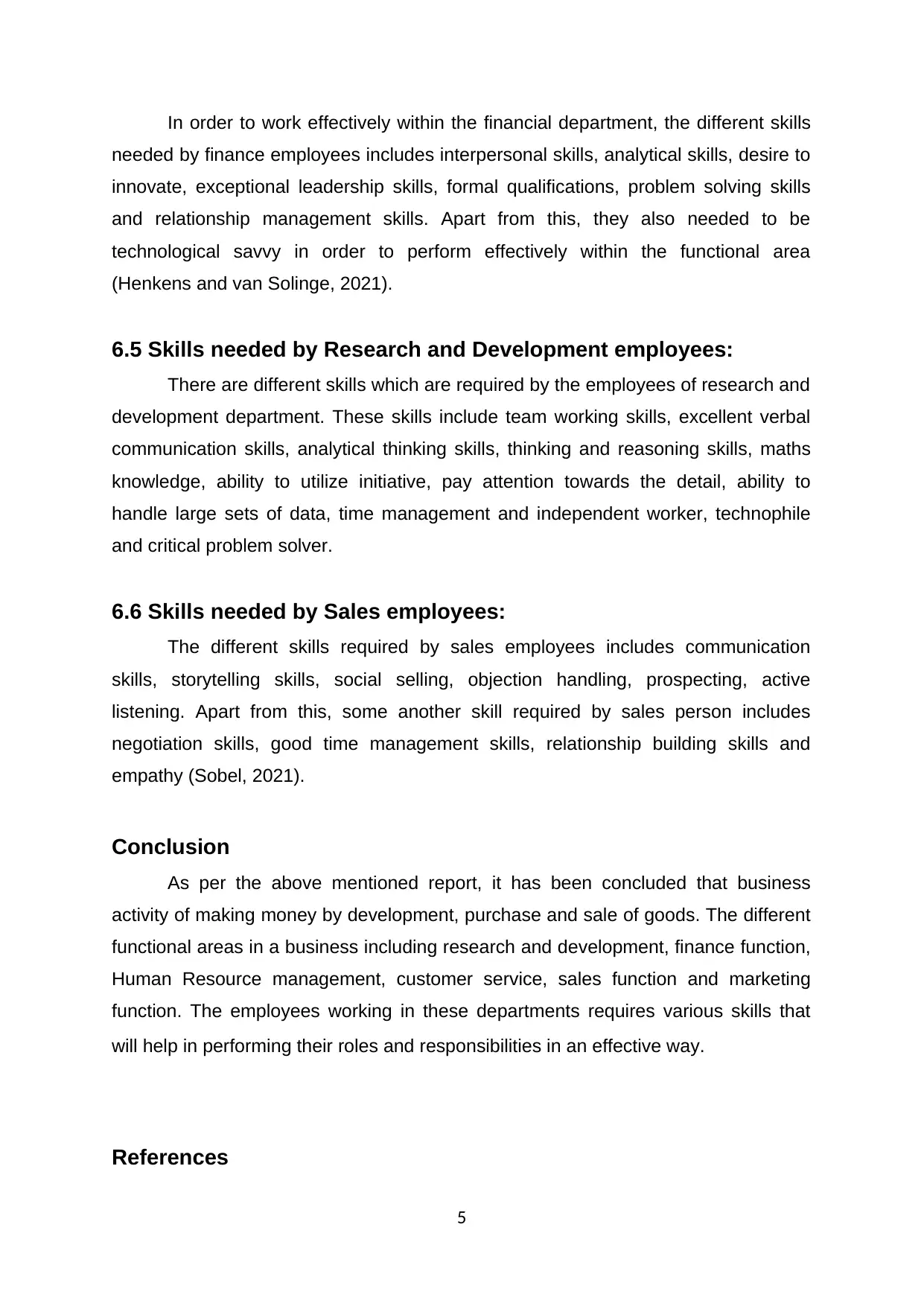
In order to work effectively within the financial department, the different skills
needed by finance employees includes interpersonal skills, analytical skills, desire to
innovate, exceptional leadership skills, formal qualifications, problem solving skills
and relationship management skills. Apart from this, they also needed to be
technological savvy in order to perform effectively within the functional area
(Henkens and van Solinge, 2021).
6.5 Skills needed by Research and Development employees:
There are different skills which are required by the employees of research and
development department. These skills include team working skills, excellent verbal
communication skills, analytical thinking skills, thinking and reasoning skills, maths
knowledge, ability to utilize initiative, pay attention towards the detail, ability to
handle large sets of data, time management and independent worker, technophile
and critical problem solver.
6.6 Skills needed by Sales employees:
The different skills required by sales employees includes communication
skills, storytelling skills, social selling, objection handling, prospecting, active
listening. Apart from this, some another skill required by sales person includes
negotiation skills, good time management skills, relationship building skills and
empathy (Sobel, 2021).
Conclusion
As per the above mentioned report, it has been concluded that business
activity of making money by development, purchase and sale of goods. The different
functional areas in a business including research and development, finance function,
Human Resource management, customer service, sales function and marketing
function. The employees working in these departments requires various skills that
will help in performing their roles and responsibilities in an effective way.
References
5
needed by finance employees includes interpersonal skills, analytical skills, desire to
innovate, exceptional leadership skills, formal qualifications, problem solving skills
and relationship management skills. Apart from this, they also needed to be
technological savvy in order to perform effectively within the functional area
(Henkens and van Solinge, 2021).
6.5 Skills needed by Research and Development employees:
There are different skills which are required by the employees of research and
development department. These skills include team working skills, excellent verbal
communication skills, analytical thinking skills, thinking and reasoning skills, maths
knowledge, ability to utilize initiative, pay attention towards the detail, ability to
handle large sets of data, time management and independent worker, technophile
and critical problem solver.
6.6 Skills needed by Sales employees:
The different skills required by sales employees includes communication
skills, storytelling skills, social selling, objection handling, prospecting, active
listening. Apart from this, some another skill required by sales person includes
negotiation skills, good time management skills, relationship building skills and
empathy (Sobel, 2021).
Conclusion
As per the above mentioned report, it has been concluded that business
activity of making money by development, purchase and sale of goods. The different
functional areas in a business including research and development, finance function,
Human Resource management, customer service, sales function and marketing
function. The employees working in these departments requires various skills that
will help in performing their roles and responsibilities in an effective way.
References
5
⊘ This is a preview!⊘
Do you want full access?
Subscribe today to unlock all pages.

Trusted by 1+ million students worldwide
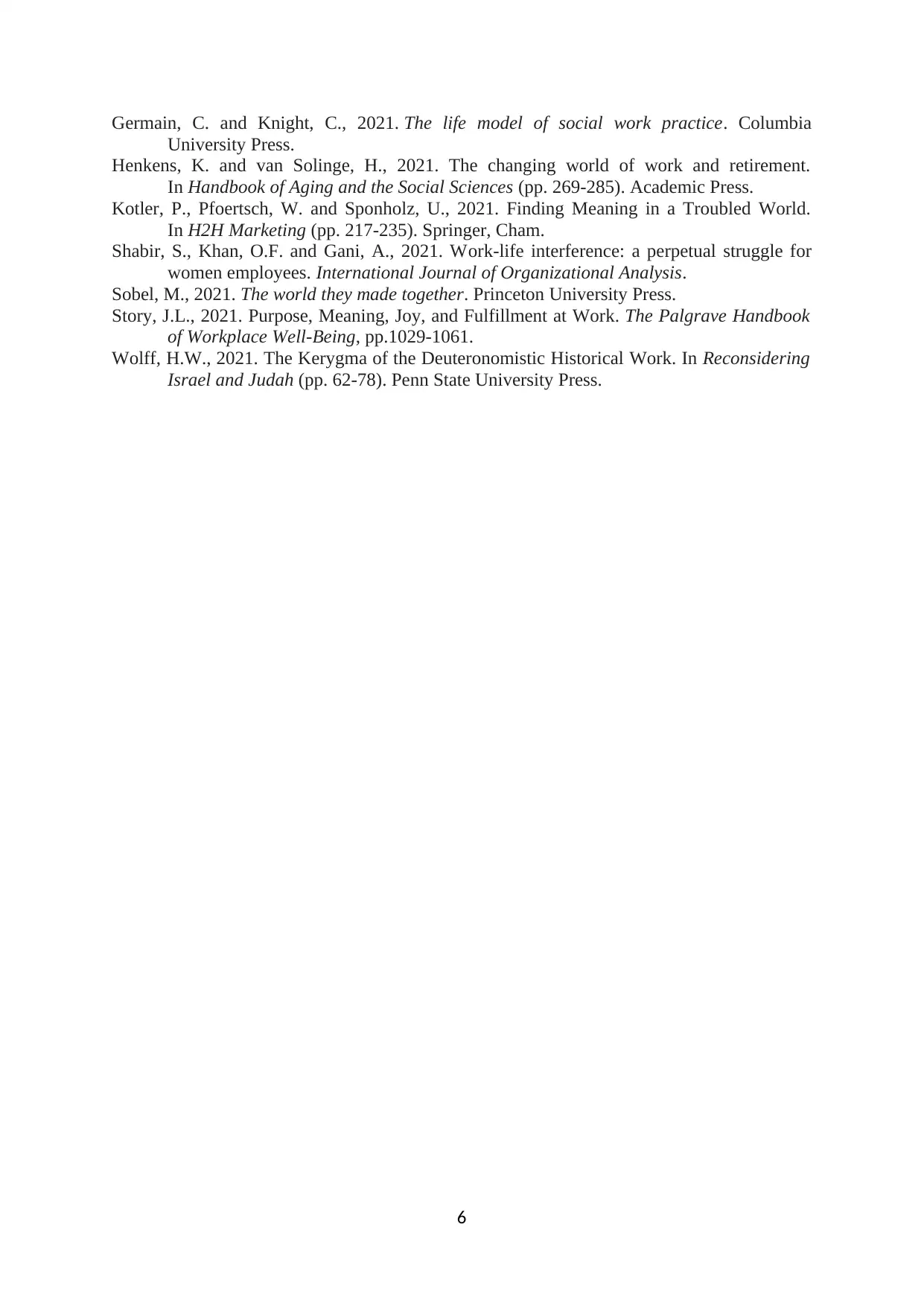
Germain, C. and Knight, C., 2021. The life model of social work practice. Columbia
University Press.
Henkens, K. and van Solinge, H., 2021. The changing world of work and retirement.
In Handbook of Aging and the Social Sciences (pp. 269-285). Academic Press.
Kotler, P., Pfoertsch, W. and Sponholz, U., 2021. Finding Meaning in a Troubled World.
In H2H Marketing (pp. 217-235). Springer, Cham.
Shabir, S., Khan, O.F. and Gani, A., 2021. Work-life interference: a perpetual struggle for
women employees. International Journal of Organizational Analysis.
Sobel, M., 2021. The world they made together. Princeton University Press.
Story, J.L., 2021. Purpose, Meaning, Joy, and Fulfillment at Work. The Palgrave Handbook
of Workplace Well-Being, pp.1029-1061.
Wolff, H.W., 2021. The Kerygma of the Deuteronomistic Historical Work. In Reconsidering
Israel and Judah (pp. 62-78). Penn State University Press.
6
University Press.
Henkens, K. and van Solinge, H., 2021. The changing world of work and retirement.
In Handbook of Aging and the Social Sciences (pp. 269-285). Academic Press.
Kotler, P., Pfoertsch, W. and Sponholz, U., 2021. Finding Meaning in a Troubled World.
In H2H Marketing (pp. 217-235). Springer, Cham.
Shabir, S., Khan, O.F. and Gani, A., 2021. Work-life interference: a perpetual struggle for
women employees. International Journal of Organizational Analysis.
Sobel, M., 2021. The world they made together. Princeton University Press.
Story, J.L., 2021. Purpose, Meaning, Joy, and Fulfillment at Work. The Palgrave Handbook
of Workplace Well-Being, pp.1029-1061.
Wolff, H.W., 2021. The Kerygma of the Deuteronomistic Historical Work. In Reconsidering
Israel and Judah (pp. 62-78). Penn State University Press.
6
1 out of 7
Related Documents
Your All-in-One AI-Powered Toolkit for Academic Success.
+13062052269
info@desklib.com
Available 24*7 on WhatsApp / Email
![[object Object]](/_next/static/media/star-bottom.7253800d.svg)
Unlock your academic potential
Copyright © 2020–2026 A2Z Services. All Rights Reserved. Developed and managed by ZUCOL.


